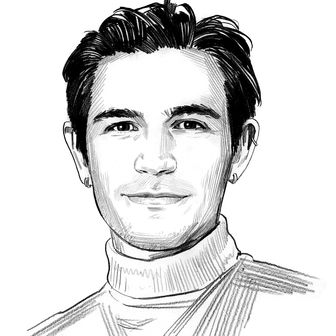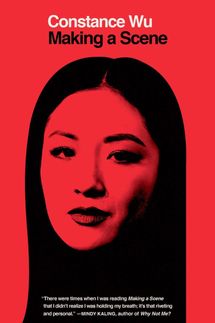
Constance Wu has been making scenes all her life. The actress, who led the box-office darling Crazy Rich Asians and later became an unexpected star in Hustlers, found herself making her biggest scene when she shared a series of strongly worded tweets after the surprise season-six renewal of the show that made her famous, ABC’s Fresh Off the Boat. Her behavior, which she addresses head-on in her new memoir, Making a Scene, which is out today, gave her a reputation for being a diva, and now, more than three years later, she’s ready to explain. Throughout the book, Wu describes some of the most difficult and harrowing moments of her life, sometimes in memoir format, sometimes adopting the role of a screenwriter with scripts telling the story of her life. Wu wrote Making a Scene to give context to her “big feelings,” including some early-life indignities, later traumas, and self-analysis. Below, eight stories that reveal it all.
The time she was accused of plagiarism
While Making a Scene details the most difficult and traumatic moments of Wu’s life, she says the one that “hurts the most,” happened in eighth grade when she was accused of plagiarism. Wu’s teacher, described as having “the ballsy attitude of Elaine Stritch and the self-satisfied charm of Fran Drescher,” gave the class their first writing assignment, and when the time came to turn in their papers, Wu’s opening paragraph on Beethoven was deemed too good. “You are not good enough to have written this,” Wu claims her teacher told her. When she couldn’t find proof of the plagiarism, the teacher asked Wu’s other teachers if they thought she could have written it. Notably, the only one who said he believed she could was the drama teacher. “So that’s why I became an actor,” Wu says. “Of course I did.”
Fresh Off the Boat made her face Asian stereotypes
The daughter of two Taiwanese immigrants, Wu grew up in the Virginia suburbs. Despite being one of the few Asians in her town, she says she didn’t always claim her “Asian-ness” very loudly, and she resented Asian characters onscreen who spoke with accents. “It was like in that movie Jurassic Park when they figured out the T. rex can’t see you if you don’t move,” she writes. “Anytime an Asian brought attention to their Asian-ness on TV, it was like they were running around in front of a T. rex. Shut up! Go away! I wanted to yell at them. Stop making us look bad.” Not until she was cast on Fresh Off the Boat as Jessica Huang, a Taiwanese mother who has an accent, was Wu able to embrace her identity. “The softest spot of all was her Asian-ness — her demeanor, her values, her accent,” she writes. “She wasn’t trying to avoid the T. rex; she was taunting it.”
Wu learned to love the character — not despite her “stereotypical” qualities but because of them. “There are real people who genuinely embody stereotypical attributes — they’re our mothers and fathers, our uncles and aunts, our brainy cousins — I don’t want to hide their voices or their stories,” she explains. “Stereotypes are not harmful for their mere existence; they’re harmful for their reduction of a person or group.”
She faced abuse on the set of FOTB
Fresh Off the Boat was an innovative sitcom for its portrayal of an Asian American family, but that doesn’t mean working on the set was easy. One of the most harrowing moments in Wu’s memoir is her description of working with an abusive producer she refers to as M—. She describes him as a controlling man: He allegedly made Wu fire her agent in favor of one he preferred, told her to wear shorter skirts, and repeatedly told her, “You do what I say.” The story of their time together culminates in a scene, written in script form, that is an amalgamation of a few stories. In the scene, M— persuades Wu to go to a Lakers game with him and then allegedly touches her against her will. He puts his hand on her thigh, Wu claims, saying, “Your skin is so smooth.” Then, “She swats his hand away in a nonthreatening, playful way. M— grins and tightens his grip, moving his hand farther up her inner thigh.” Ultimately, “(He grins and slides his hand up to graze her crotch.)” When Wu forcefully tells him to stop, he allegedly tells her she has big arms.
Her tweet about FOTB was really about M—
Perhaps the most publicized Wu story occurred when Fresh Off the Boat was surprisingly renewed for a sixth season. In response, Wu tweeted, “So upset right now that I’m literally crying. Ugh. Fuck,” followed by a series of other negative tweets about the show’s renewal. “Suddenly, everything I’d held back for so long flooded the atmosphere and I felt like the hot microwaved tomato all over again,” she writes in her book. “I didn’t care how I sounded; I just needed to finally make a sound.”
The overwhelming, extremely negative response to her tweets, which included several DMs from a former colleague admonishing her, made Wu feel completely “helpless and desperate.” That moment led to her considering taking her own life. “I realized I needed a wound to prove it, to prove that I hurt as bad as everyone said I deserved to hurt and it couldn’t be a little wound, it had to be the biggest wound in the world for it to be enough,” Wu shared. A friend found Wu and took her out of her apartment. “We were directed to the psychiatric ER of a mental hospital, where they took everything away from me and put me in a hospital gown,” she wrote.
A former colleague sent the worst response to the Twitter scandal
A “very upset former colleague” of hers sent Wu DMs calling her “a blight on the Asian American community.” “Though I hadn’t seen or talked to her in more than a decade, she replied with DM after DM shaming me,” Wu says. “She told me how the show had been her son’s favorite, and how I had ruined it for him and no matter what I did, I would never, ever be able to make up for it.” That response was extremely difficult for Wu. “Why wouldn’t she believe my remorse?” she asks in the book. “That I hurt as badly as she thought I deserved to hurt?” Discussing it on The View on October 4, Wu refers to the woman as an actress, prompting speculation online.
Wu experienced sexual assault in her 20s
One of the most difficult-to-read essays in the book details Wu’s rape at 22. She describes a date with a 36-year-old man who, after some “fooling around,” started putting on a condom, “an obvious signal for sex — which I did not want.” Then, despite her telling him multiple times that she didn’t want to have sex with him, he raped her. Afterward, he gave her a 20-page medieval-fantasy manuscript he had written for her after their first date called “The Beating Heart of the Forest.” Wu says she blocked the story from her mind until one day it all came back. “I was on a plane from Singapore, where I had finished filming Crazy Rich Asians,” she writes. “I’d just woken up from a nap when the realization hit me like a flood. That was rape.” Despite that, “I couldn’t call it ‘rape,’” for a long time. Now with help from her therapist, Wu is ready to call it what it was. “I did not consent to sex. Maybe it wasn’t violent, but it was rape. Period.”
She had to realize she was difficult on set
If Wu is known for being difficult, then Making a Scene’s intention is not to completely deny her behavior but to explain it. Wu says much of her difficult behavior on set was linked to M—’s inappropriate behavior. “But repressed feelings don’t just disappear because you will them to, and they inevitably come out in other ways: paranoia, jealousy, isolation,” she writes. “Uncharacteristic, illogical behavior followed.” That included a time she blew up at her co-star Randall Park after he did a radio interview she was supposed to be a part of but was excluded from. It wasn’t Park’s fault, she acknowledges, “but I remained upset, punished him for days by pouting every time he came near me.”
She once got in trouble for sexual harassment
One of the most surprising moments in Making a Scene is when Wu apologizes for her own instance of sexual harassment. “I am guilty of sexual harassment. Of being the harasser,” she says. “I had a problem: I couldn’t stop writing the word penis.” It turns out that while on Fresh Off the Boat, Wu got annoyed one day that the word boob was a punch line to a joke, so she decided that if boobs were jokes, then penises should be too. She wrote the word penis very regularly while playing Jessica Huang: “Every time you saw my character writing on a legal pad, signing a check, or making a grocery list, I was writing the word penis over and over again.” Then someone on the crew complained about it being “inappropriate,” and one of the producers had to ask Wu to stop. Now she’s very sorry for putting someone else in an uncomfortable situation. “I apologize and I recognize the problem,” she says. “This is an earnest apology. From the bottom of my boob, I am sorry.”
This post has been updated throughout.
If you or someone you know is in crisis, please call the National Suicide Prevention Lifeline at 1-800-273-TALK (8255) or contact the Crisis Text Line by texting TALK to 741741.



